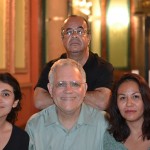(Against Monolingual Torture of Writers, Part Two)

Sunday, September 6.
Late yesterday afternoon, Linda and I drove to Avenue 50 Gallery, where Jorge Humberto Chavez was the featured reader. Jorge was the major organizer of the San Luis Potosi International Literary Festival this past August, and I was very pleased that at least 30 people turned out to hear his poetry. I was among the half-dozen poets who read short introductory sets, and I was especially pleased to look out at the audience when I got up to read and see Phoebe, Ron, Chrissy, Liz, Rachel, Carol and Ted. (Carol Colin’s very fine exhibit of aquarium paintings was still up, and I hope to get one of her watercolors.) I started off with a poem that was very popular in my tour of Mexico, “One Miracle,” which is dedicated to Bob Flanagan. Then I recited “Big Band, Slow Dance” and read “Milk,” which is Jose Rico’s favorite poem in Pruebas Ocultas. I finished with “Why the Heart Does Not Develop Cancer,” which caused Nylsa Martinez to jump up and say, “Let me read that in Spanish.” Her rendering of the poem was quietly eloquent and added another layer of deep listening to the poem’s journey since its first publication in 2002. Nylsa’s “acoustic” version of “Heart” made me feel as if I were back in Mexico again, hearing my fellow poets amplify my readings to the audience. I especially appreciated how several people in the audience at Avenue 50 (Tschka Moran, who is a photographer, and his friend, Gustavo; Martha; and Lupe Carranza) talked with me afterwards about the poems.
Jorge read very well, and Anthony’s translations and renderings of the poem made even those of us whose Spanish is limited feel the solemn undercurrent of Jorge’s honest grief. His choice of a poem that invokes WC Williams’s trip to El Paso and Juarez was a brilliant way to end his presentation. Thank you, Jorge, for making this trip to Los Angeles, and thank you Jessica Ceballos for setting up this event. Other readers included Anthony Seidman, David Shook, Mandy Kahn, and Gloria Edina Alvarez, each of whom read work that directly or indirectly addressed issues of translation. In particular, Mandy Kahn read a poem that suggested how much translation is like quilting in the sense of contiguous collaboration. A splendid evening!
 About Bill Mohr
About Bill Mohr